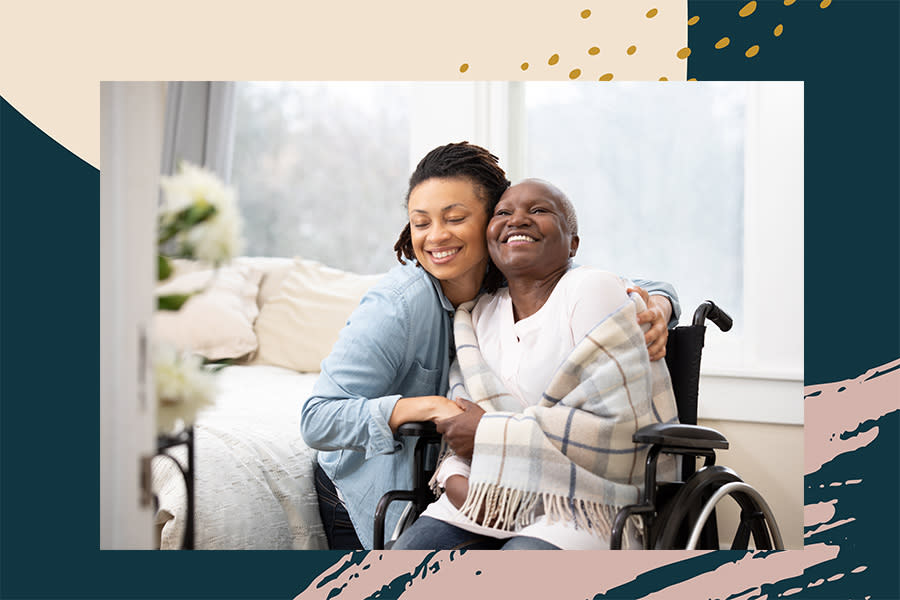How these 3 disabled mothers view motherhood and cope while parenting with disabilities
Warning: This story is incredibly triggering for those who have lived with or have had disabled parents. Please read with caution.
Motherhood is hard enough, let alone being a mother with a disability. Whether it’s physical or mental, 2012 research from the National Council on Disability found there were 4.1 million parents with disabilities in the U.S. But when one discusses the topic of disability, it can be easy to imagine someone who cannot move or walk, when in fact, that’s far from the case.
“Most people think ‘disability’ and [automatically] think wheelchair or immobility,” Rose Reif, North Carolina-based professional counselor who helps adults with disabilities and special needs parents cope with anxiety, depression, and other services, tells HelloGiggles. However, as she points out, “the legal definition of a person with a disability, according to the Americans with Disabilities Act, is someone who has a physical or mental impairment that substantially limits one or more major life activity.”
In fact, there are several people with “invisible disabilities.” Kat Inokai, a Toronto-based producer and writer, and mother of two, is one of them. She has Crohn’s disease, Hashimoto’s thyroiditis, mixed connective tissue disease (MCTD), and postural orthostatic tachycardia syndrome (POTS, which is a form of Dysautonomia). These conditions have also triggered a number of others, such as severe migraines (hemiplegic), fibromyalgia, gastroparesis, colonic inertia, spondylosis (spine degeneration/osteoarthritis), and spondylitis (inflammatory arthritis), which she tells HelloGiggles, is in remission. To stay mobile with her symptoms, Inokai uses a cane, rollator, and Alinker.
“My personal experience with chronic illness took me from complete denial to living with an invisible illness that I could choose to hide from people if I wanted to a visible condition that obviously interfered with my abilities and quality of life,” she says. “If you count the years pre-diagnosis, this is a 20+ year journey. It’s only been in the last two years where I’ve, albeit hesitantly, started to incorporate ‘disabled’ into my vernacular.”
For Inokai, deciding to use the word “disabled” was less about liking it, and more about coming to terms with it.
Part of that hesitancy, Inokai says, “comes from an unwillingness to accept a socially determined ceiling on what I can achieve, which is how it’s interpreted. Of course, that’s exactly the same reason why I’ve started saying [the word] more [often], because there is never enough advocacy for those of us [who] are deemed disabled due to our health or genetics, [but] who biologically present differently, or who simply need different resources and accessibility strategies to get through our daily lives.”
How these disabled mothers parent their children and view motherhood
When it comes to parenting, Inokai says common challenges run the gamut from accessibility to discrimination to symptom management to anxiety and depression.
undefined
In fact, Inokai says her biggest obstacle as a disabled mother is “trying to normalize the way I thrive with my family, in a world that is pretty quick to point out that you’re different, where there is little to no representation for disabled people in general, let alone disabled mothers.”
Reif says Inokai’s feelings are common among disabled moms. “What most of my clients describe as the most difficult thing about being a disabled parent has very little to do with their child and with their disability,” she says. “What’s truly challenging and overwhelming is the judgment and assumptions that they face from others.”
Inokai says she spends a great amount of time thinking about and planning her steps to avoid such encounters, especially since she’s had her driver’s license suspended due to her symptoms.
undefined
Michelle Anderson, a motivational speaker and mother of two, can relate. Anderson, who’s been diagnosed with epilepsy at the age of six, says, the biggest challenge for her as a disabled mom is “because I have seizures more than once in a three-month period, I don’t drive,” she tells HelloGiggles. “In fact, I have never driven. If I can’t get to the grocery store, we don’t have food. If I want to go out for coffee with a friend, I need to ask for a ride. [My husband] does the best he can to provide help here but contrary to my belief, he is not Superman. We have a driver who also helps [us], but there is just no substitute for being able to drive yourself.”
Another difficult aspect of her epilepsy, says Anderson, is how it can affect her children’s perception of her.
undefined
For her part, Anderson doesn’t like the term “disabled.”
undefined
Katherine Wolf, mother of two and co-author with her husband, Jay, of Suffer Strong: How to Survive Anything by Redefining Everything, was a brand new mom when she suffered a massive brain stem stroke at the age of 26. “It came without warning. I was perfectly healthy. My baby, James, was six months old. I totally should have died. It was a miracle I lived, much less that I recovered enough to go on living my life,” she says. “Nearly 12 years later, I have regained so many abilities and a new kind of motherhood, but so many struggles remain. I can’t walk well or drive. I have double vision and my right hand lacks fine motor coordination. Those disabilities and more create great obstacles for caring for children and just [living a] normal day-to-day life.”

For Wolf, the pain of the loss of her motherhood was far worse than any physical pain she experienced after her stroke.
undefined
How these mothers cope
When it comes to coping with her disability and motherhood, Wolf says she is grateful to lean on her husband, Jay, and others close to her in her life. “If [my] disability has taught me nothing else, it’s taught me to lean onto others with vulnerability and humility. I’m a people-pleaser, type-A personality, and it took years before I felt I could truly ask for help,” she says. “I felt like I was burdening people when in reality, they actually felt grateful to come alongside me and help lift the burden.”
A fear of asking for help is common amongst the clients Reif works with. “All moms, but especially moms with disabilities, can become paralyzed by guilt if they feel the need to ask for support. They can easily start to believe that because they wanted to be a parent, they should be able to handle all the stressors that they face without needing assistance,” she says. “This is quite simply unrealistic for any parent, regardless of whether they have a disability [or not]. Parents with disabilities should understand that their friends and family may not be providing support because they are simply unsure of what is needed or what would be helpful. These moms can, hopefully, recognize that the more explicitly they can request the specific support they need, the more readily they will receive that support.”
Reif says she often asks her clients to consider how they would want a friend to act if they needed help. “Would they want their friend to suffer in silence, or would they want to know exactly what they could do to help their friend feel better,” she says. “When it’s put this way, it’s easy to see that we’d all want to help a friend in need, and that we’d appreciate knowing specifically how we could do this.”
Anderson, who relies on her husband and a medical team as her main sources of support, says she does her best to develop a trusting relationship with a person before she asks for their help. “I want them to know me already as a capable person who just happens to deal with epilepsy. Then when I ask for help picking up the kids or babysitting when my husband has to take me to the doctor, it doesn’t feel as uncomfortable,” she says. “We are blessed with quite a few willing friends of this fashion, and I make it my mission to never take them for granted.”
Inokai says she relies on a support network made up of her husband, specialists and doctors, family, friends, and therapists. “I’m always adding to [this group],” she says. I go to a psychotherapist regularly, and I also had a great nutritional therapist who would check in with me weekly. I meditate and try to integrate mindful practices into my everyday life and parenting. I try to listen to my body and rest, but also exist outside of my comfort zone so I can grow.” Inokai says she’s also incredibly grateful for social media.
undefined
However, Inokai says she wishes there are more support and resources available for disabled moms as well as for the general public about what it means to have a disability.
undefined
How they see their disability as a mother superpower
Parents with disabilities are very adept at adaptation, says Reif. “[Most parents] aren’t afraid to try new and creative things. [They try to] find gratitude for [the things that are] working now without worrying how long [they] will continue to work,” she says. “These kinds of distress tolerances and adaptations are amazing skills [for mothers] to model for [their] children.”

Inokai agrees. “I think if anything, I have become more resilient,” says Inokai. “And it’s been an eye-opener for both me and my children that there is always more than one way to do something. Instead of saying ‘I can’t,’ I approach it from a discovery angle and say ‘What are some ways that I could do this?’ and it’s amazing how many creative strategies I come up with.”
undefined
Wolf adds that while she might not be able to change her circumstances, she and her family can change how they think about them. “It’s easy to tell ourselves a story of denial, pretending we’re all good, nothing to see here. It’s also easy to tell ourselves a story of despair, like this is the worst thing that’s ever happened to anyone,” she says. “The truest and most transformational story we can tell ourselves is the story of hope, and it’s actually bittersweet.”
At the end of the day, none of these mothers want their kids to experience pain. They want their children to live fulfilling and meaningful lives, even when they might not be able to parent the way they truly desire. But even when things are difficult and extremely painful to manage, these and other disabled mothers hope their stories will inspire their children to live a life with love and compassion.
“None of us want our kids to experience pain, but I’ve seen the beautiful fruits of struggle already showing up in my kids’ lives. And working with other families with disabilities has shown that some of the most compassionate and lovely people are the ones who have had parents or siblings with disabilities,” Wolf says. “We all give our kids wonderful and terrible things, most of which we have no control over. I’m sure this experience will leave some wounds, but I pray it will mostly leave my kids with a different kind of hope that changes everything for them.”
If you are struggling and need help, call the National Alliance on Mental Illness HelpLine at 1-800-950-NAMI (6264), available Monday through Friday, 10 a.m.–6 p.m., ET. If this is an emergency, you can call the National Suicide Prevention Lifeline at 800-273-TALK (8255) or text NAMI’s Crisis Line at 741-741. However, if you sense a loved one is experiencing abuse, please call the National Domestic Violence Hotline at 1-800-799-SAFE (7233).

